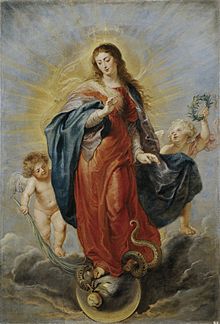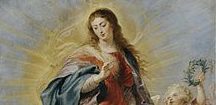Hail Mary full of grace
The Lord is with thee.
Blessed art thou amongst women
And blessed is the fruit of your womb…….Jesus
Holy Mary Mother of God
Pray for us sinners, now
And at the hour of our death………..Amen.

Hail (Ave) Maria (Latin), O Gracious one, beloved of God, Chaire (Gk meaning rejoice) O favoured one. Shalom O beautiful one (Heb) the salutation of the Angel Gabriel to Miriam, a name first heard as the name of Moses’s sister but also a common name for women during the late centuries before the arrival of Immanuel and AD (anno domini). This name, further to mean “beautiful lady”. And there is also an allusion to “Highness.”
In the name alone there is much said which implies the greatness of the one addressed which was later professed in the prophetic words of the Magnificat “All Generations will call me blessed” (Lk1:48).
The allusion to” beautiful lady” reminds us of the words of seers who have professed to have had visions of the Blessed Virgin Mary, and without exception, all have been speechless at her great beauty. “The beautiful lady” (the seers of Fatima) “the beautiful lady” (seers of Medjugorje) the “beautiful lady” (Bernadette Soubirous) the “beautiful lady” (the children of Garabandal). Always attempting to describe the beauty of the Blessed virgin using the words of an earthly language to describe someone from a heavenly reality. The words used always falling short of describing her beauty and perfection.
Perhaps the words of the former Cardinal Ratzinger now Pope Emeritus Benedict XVI expressed in his Daughter of Zion speak something exquisite about Mary’s name “ The figure of the woman, until then seen only typologically in Israel although provisionally personified by the great women of Israel, also emerges with a name: Mary. She emerges as the personal epitome of the feminine principle in such a way that the principle is true only in the person, but the person as an individual always points beyond herself to the all-embracing reality, which she bears and represents.” Mary. Beautiful one.
Even the insinuation inscribed in her name “highness” has its type or shadow in Old Testament words “Then Bathsheba came to king Solomon, to speak to him for Adonijah and the king arose to meet her, and bowed to her, and sat down upon his throne: and a throne was set for the king’s mother, and she sat on his right hand.” (l Kings 2:19). Highness and honour paid to the mother of the King. In her name and salutation all heavenly praise for this woman of grace are embedded.
“Full of Grace”, (kecharitomene-Gk) or even “enriched with grace,” the Angel says of her (Lk 1:28) are an expression never used before this time. Not even in OT testament Scripture is “full of grace” addressed to another human being. Is this to be her new name? “Full of Grace?”
It’s an interesting thought that the Angel begins the dialogue with Miriam by addressing her as “Hail, Full of Grace” (new name) which has its precedence in Old Testament name change (Sarai to Sarah). Further, we see that when God wanted to do something special, something new he enacts a name change to fit the mission. God changed the name of Abram to Abraham ( to fit the mission of being father of many) and later we see Jesus change the name of Cephas to Peter (rock/stone) So the Angel began by announcing her change of name from what it was “Miriam,” to that which would describe her mission. God bearer. Theotokos (CCC 495).
“The Lord is with thee” and thus grace filled because of the infilling and overshadowing by the Holy Spirit. Full of grace is also a language of tabernacling. The Lord came and again tabernacled with His people and re-entered into His new Ark of the Covenant. A new unspoiled tabernacle was found for Him.
The honour given to a woman’s most honourable body organ is her “womb” because in this is formed life and so “blessed is the fruit of your womb,” Miriam’s cousin Elizabeth continued and affirmed her new appellation “Full of Grace” and status with ‘Blessed are you among women and blessed is the fruit of your womb” (Lk 1:42). Redemptive and holiest maternity which would begin the journey towards the new covenant and redemption, promised eons earlier. The time had now come for that redemptive work to begin and it had to begin with “ Full of Grace,” “Beautiful Lady,” “Highness,” “Theotokos” as only one like this would be worthy of birthing the Immanuel, the God is with us. Full of Grace the beautiful portal through which the Holiest would re-enter into the human race/family.
Elizabeth, a Jewess, under the influence of the Holy Spirit, utters the confirming words of Mary’s angelic announcement Hail Full of Grace blessed is the fruit of your womb. Elizabeth, inspired by the Holy Spirit, understood that the child in Mary’s womb was not conceived in the human manner, or is even to be a Messiah of human understanding, (e.g. King David) but is “the Lord” Himself residing in Miriam’s holy womb. Perhaps this could be seen as the first instance where Miriam (Mary) was proclaimed as ‘Mother of God.” The first mention of this name appears in the oldest extant prayer addressed to Mary which is dated to 240-250 AD. The Sub Tuum praesidium meaning “under thy protection we seek refuge, O Holy Mother of God.” (Hymn) Later the Council of Ephesus in 431 declared this fact to be a reality and a dogma of the Church.
However, it was not until the sixteenth century that the words “Holy Mary Mother of God, pray for us sinners now and at the hour of our death” were added to the Angelic salutation, and to Elizabeth’s salutation and exclamation of joy.
Holy Mary Mother of God expresses her truly having borne and given birth to the Word of God, the Father’s Son, consubstantial with the Father. Jesus, her baby, her son. He by whom the universe came into being, rested peacefully in her holy womb, just as a human child does and took from her, her human flesh and human nourishment whilst he Himself carrying His divine soul and nature, and thus accordingly the true God and true man appellation and to Mary the appellation “Mother of God.” “Full of Grace.” “Beautiful lady” (Kecharitomene-Gk).
Pray for us now during the journey in this lifetime but especially as we make the final walk towards the Father’s house, in that hour when hell’s fury will be unleashed, at the hour of our death, be with us and finally present us to the Father and His and your Son…. Jesus.









